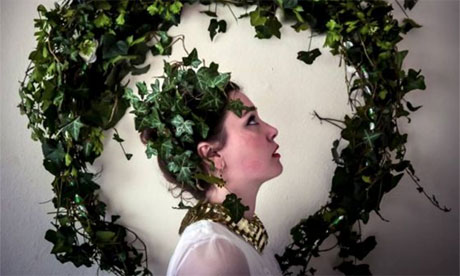This was a festival with impressively cheap tickets, major names and the launch of a "difficult second album" by an artist who shook up the English folk scene with her debut, six years ago. Lisa Knapp is clearly a perfectionist, as is her husband/producer/fellow multi-instrumentalist Gerry Diver, so it was intriguing to hear how the highly elaborate Hidden Seam would sound live.
In the event, she only performed two-thirds of the album, mixing the new material with old favourites such as Blacksmith, but this was an impressive reminder of her bravely original style. Both Knapp and Diver understand the importance of musical dynamics, subtlety and surprise; the best songs switched between the delicate and the startling, dominated by Knapp's autoharp, harp and fiddle and Diver's adventurous contributions on fiddle, keyboards, banjo or autoharp. There was a fine, atmospheric treatment of the highly experimental Shipping Song – a list of British sea areas set to music, influenced by the late Seamus Heaney, and a treatment of Lal Waterson's Black Horse that sounded far more gutsy and freewheeling than the album version. Then there were reminders of the production effects on the new set, with Knapp duetting with a backing track of herself on the title track, but she is far too strong a singer to need to rely on technology.
This was also a good festival for the bearded, gangling Scottish folk hero Alasdair Roberts, thanks partly to his collaborations with newcomer Olivia Chaney, who provided vocal, harmonium, guitar and piano backing during his set, in which he was also joined by Jordan Hunt on violin and David McGuinness on keyboards. Roberts has a light, soulful voice and he switched effortlessly between his own songs and Scottish traditional ballads, moving from the drifting Fusion of Horizons to an exquisite version of The Fair Flower of Northumberland.







